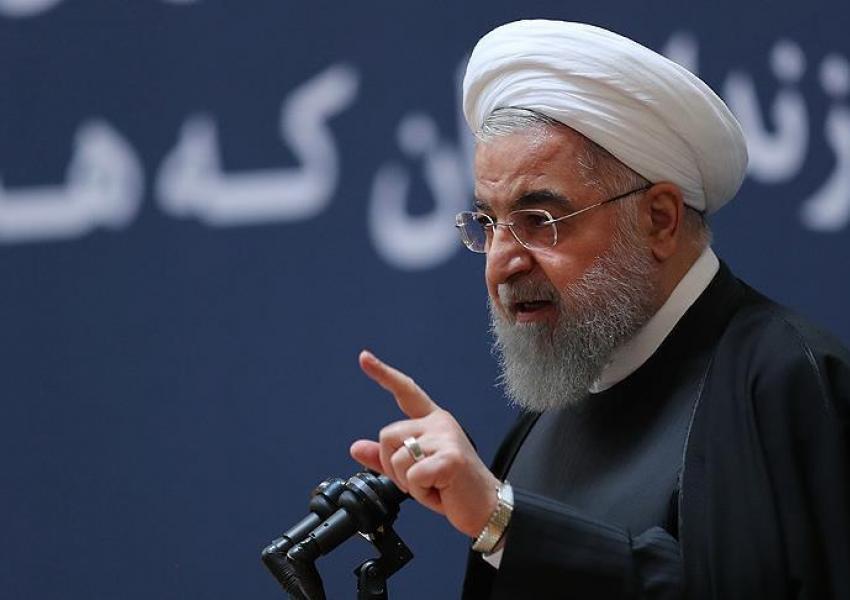
Iran's Rouhani Accused Of Showing Weakness In Overture To Revive Nuclear Deal
Iranian parliamentarians on Wednesday [March 10] accused President Hassan Rouhani of sending wrong signals to the United States over reviving Tehran’s 2015 nuclear deal with world powers. Rouhani had hours previously said Iran would return to compliance immediately sanctions were lifted.
Critics of Rouhani, including websites affiliated with the Revolutionary Guards, immediately attacked the president saying he is undermining Supreme Leader Ali Khamenei’s position that after US lifts its sanctions, the Islamic Republic needs time to verify their true impact.
"By making these remarks the President wants to be seen as an advocate of the lifting of sanctions so that the political current that supports him can win in the elections again," Nasrollah Pejmanfar, Chairman of the parliament's Article 90 Committee, said. Pejmanfar insisted that US sanctions would not be lifted and that the problems faced by Iran and "the economic hardships that are forced on people” did not result from sanctions but "from negotiations." Pejmanfar said the weakness of Rouhani's government had encouraged "the enemy" to exert more pressure.
The lifting of US sanctions before Rouhani leaves office would be a winning card in his hand lending weight to his chosen candidate in the upcoming elections as the Iranian public almost unanimously wishes a sanctions-free economy. Vice-President Es'hagh Jahangiri and Foreign Minister Mohammad Javad Zarif − two of Rouhani's closest associates – are both likely candidates although the latter has insisted that he has no intention of running. Both have a good chance of getting the support of reformist parties.
Hardliners, many of whom opposed the 2015 deal, have been accused of tying the issue of the lifting of sanctions and a US return to the deal – the JCPOA, Joint Comprehensive Plan of Action) − to the June election and thereby suggesting to Washington that talks with Iran would be easier if the US delayed engagement until a principlist president took office.
Some, including the Chairman of the Parliament's National Security and Foreign Policy Committee, Mojtab Zolnouri, have expressly said it would be better if principlists were in charge of any negotiations. "It will have a higher implementation guarantee because principlists' [policies] are closer to those of the system's and they will not move in a direction opposed to the system's policies to have to return in the middle of the road," he said on February 3. In Iranian political jargon ‘system’ often refers to the Supreme Leader Ali Khamenei.
Last week Mohsen Rezaei (Rezaee), Secretary of the Expediency Council and a likely presidential candidates, told the Financial Times Iran would enter talks on the nuclear deal with the US and other western powers if they provided a “clear signal” that sanctions "will be lifted within a year" on a step-by-step basis.
The step-by-step approach apparently clashes with the demand from the government and Khamenei for the lifting of "all sanctions at once" in return for Iran's "immediate return to its commitments." Rezaei’s interview could be a signal to the US to wait for the next Iranian president to take office.
Zarif reacted within hours from the publication of the article. Without naming Rezaei, he said opinions of "officials who are not directly in charge of the foreign policy apparatus and nuclear negotiations" should not be confused with state policy.
In an interview with Axios, the US Iran envoy Robert Malley stressed that said Washington did not intend to link any discussions to the timetable for Iran’s elections. "The pace will be determined by how far we can get consistent with defending US national security interests," he said. "In other words, we won’t rush or slow things because of the Iranian elections."
“Possible US steps with regard to sanctions can be on the table but we need to get into a conversation with Iran, whether direct or indirect," a senior State Department official was also quoted by Axios as saying. "The president will not take unilateral steps when it comes to removing sanctions. Any substantial move by the US will have to be part of a process in which both sides take actions …The US is prepared to resume full compliance with the deal if Iran does, and we are ready to engage in meaningful diplomacy to get there. "
The official pointed out that US and Iranian interpretations of full compliance with the JCPOA would have to be negotiated: “That’s why we expect there could be difficult talks, even as we both agree on the goal, and even as we agree on a roadmap to get there.”






